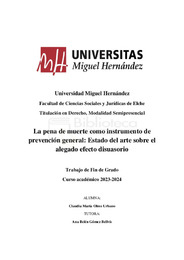Resumen :
La eficacia de la pena de muerte como medida disuasoria en la prevención del crimen es un tema que ha generado un debate intenso y prolongado. Este trabajo se centra en evaluar si la pena capital realmente cumple con su objetivo de reducir la criminalidad de manera más efectiva que otras sanciones penales. El estudio surge del problema de la discrepancia entre la percepción popular de la pena de muerte como un castigo disuasorio y la falta de evidencia empírica que respalde esta creencia. El objetivo del estudio es examinar si la pena de muerte ofrece ventajas concretas en términos de disuasión criminal. Para ello, se realiza una revisión exhaustiva de la literatura existente, que incluye estudios empíricos, análisis comparativos entre países con y sin pena capital, y la evolución histórica de su aplicación. Además, se abordan los riesgos asociados a la pena de muerte, tales como los errores judiciales y la posibilidad de que se aplique de manera desigual, afectando de manera desproporcionada a determinados grupos sociales. A lo largo del trabajo, se analizan casos específicos y se comparan los efectos de la pena de muerte con los de otras penas, como la cadena perpetua. Los resultados indican que, contrariamente a la creencia popular, la pena capital no ha demostrado ser más efectiva que otras formas de sanción en la reducción del crimen. Además, el riesgo de errores irreversibles y la falta de equidad en su aplicación ponen en entredicho su utilidad como herramienta de justicia. El estudio concluye que la pena de muerte no solo es cuestionable desde el punto de vista de su eficacia, sino que también plantea serias preocupaciones éticas y legales. Se recomienda la exploración de alternativas más humanas y eficaces para la prevención del delito, que respeten los principios de justicia y derechos humanos.
The effectiveness of the death penalty as a deterrent in crime prevention is a subject of intense and ongoing debate. This study focuses on assessing whether capital punishment truly achieves its goal of reducing crime more effectively than other penal sanctions. The research addresses the issue of the discrepancy between the popular perception of the death penalty as a strong deterrent and the lack of empirical evidence supporting this belief. The study aims to examine whether the death penalty offers concrete advantages in terms of crime deterrence. To do so, a comprehensive review of existing literature is conducted, including empirical studies, comparative analyses between countries with and without capital punishment, and the historical evolution of its application. Additionally, the risks associated with the death penalty, such as judicial errors and the potential for unequal application, disproportionately affecting certain social groups, are addressed. Throughout the study, specific cases are analyzed, and the effects of the death penalty are compared with those of other penalties, such as life imprisonment. The results indicate that, contrary to popular belief, capital punishment has not been proven to be more effective than other forms of sanction in reducing crime. Moreover, the risk of irreversible errors and the lack of fairness in its application call into question its utility as a tool of justice. The study concludes that the death penalty is not only questionable in terms of its effectiveness but also raises serious ethical and legal concerns. The exploration of more humane and effective alternatives for crime prevention that respect the principles of justice and human rights is recommended.
|
 La licencia se describe como: Atribución-NonComercial-NoDerivada 4.0 Internacional.
La licencia se describe como: Atribución-NonComercial-NoDerivada 4.0 Internacional.
.png)
